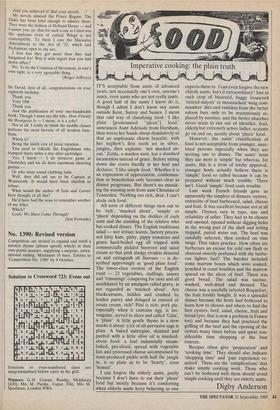Imperative cooking: the plain truth
040MOPLiati IT'S acceptable from aunts of advanced years, not necessarily one's own, anyone's aunts, even aunts who are not really aunts. A good half of the aunts I know do it, though I admit I don't know any aunts outside Kent, Surrey and Sussex. I mean that odd way of classifying food: 'I like plain [pronounced "Omni food,' announces Aunt Adelaide from Horsham, then waves her hands about dismissively so that an unpleasant charm bracelet, with her nephew's first teeth set in silver, jangles, then explains: 'not mucked ab- out.' Zelda, a maiden aunt, has a standard incantation instead of grace. Before sitting down she stares fixedly at her host and declares: 'I like simple food.' Whether it is an expression of appreciation, condemna- tion or benediction only becomes clear as dinner progresses. But there's no mistak- ing the warning note from aunt Christina of Tenterden: 'Nothing too rich, dear, I can't abide rich food.'
All sorts of different things turn out to be 'rich', 'mucked about', 'simple' or `pleen' depending on the dislikes of each aunt and the standing of the relative who has cooked dinner. The English traditional salad — wet lettuce leaves, factory proces- sed fatty ham, pithy, pippy tomatoes and green hard-boiled egg all topped with commercially pickled beetroot and salad cream so that pink sludgy rivulets descend on and extinguish all flavours — is de- scribed approvingly as 'good plain food'. The lower-class version of the English roast — 23 vegetables, stuffings, sauces and 'trimmings' competing for taste and all annihilated by an amalgam called gravy, is not regarded as 'mucked about'. Are blackcurrants, hidden and crushed by leaden pastry and deluged in custard or ersatz cream, rich? Pâté is rich: pork pie, especially when it contains egg, is rec- tangular, served in slices and called 'Gala', is 'plain'. A little gentle thyme in a stew mucks it about: a lot of all-pervasive sage is plain. A baked aubergine, skinned and puréed with a little olive oil is mucked- about food: a loaf industrially steam- baked, pre-sliced, spread with vegetable fats and processed cheese accompanied by mass-produced pickle with half the jungle in, is so plain as to be 'hearty', even `honest'.
I can forgive the elderly aunts, partly because I don't have to eat their `pleen' food but mostly because it's comforting when elderly aunts keep behaving as one expects them to. I can even forgive the new elderly aunts. Isn't it extraordinary? Just as each crop of blazered, baggy trousered `retired majors' or moustached 'wing com- manders' dies and vanishes from the better saloon bars only to be mysteriously re- placed by another, and the better churches never seem to run out of identikit, frail, elderly but extremely active ladies, so aunts go on and on, mostly about `pleen' food.
However, the aunts' classification of food is not acceptable from younger, unre- lated persons especially when they are inviting one to dinner. The aunts' term they use most is 'simple' but whereas, for aunts, this is a term of tetchy approval, younger hosts actually believe there is `simple' food so called because it can be prepared without much trouble. There isn't. Good 'simple' food costs trouble.
Last week French friends gave us apparently the simplest of dinners: oysters, entrecôte of beef barbecued, salad, cheese and fruit. It was excellent because not at all simple. Oysters vary in type, size and reliability of seller. They had to be chosen and opened, opened without digging holes in the wrong part of the shell and letting trapped, putrid water out. The beef was carefully selected, then cooked on vine twigs. That takes practice. How often are barbecues an excuse for cold raw flesh or charcoal sweetly perfumed with the barbe- cue lighter fuel? The butcher included some marrow bones which were soaked, poached in court bouillon and the marrow spread on the slices of beef. There was good bread. The salad was sucrine, washed, well-dried and dressed. The cheese was a carefully selected Roquefort, the fruit freshly bought. It was a splendid dinner because the hosts had bothered to learn how to choose and where to find the best oysters, beef, salad, cheese, fruit and bread (yes, that is now a problem in France too) and because they had practised the grilling of the beef and the opening of the oysters many times before and spent con- siderable time shopping at the best sources.
Recipes often give 'preparation' and `cooking time'. They should also indicate `shopping time' and 'past experience re- quired'. These are the 'complications' that make simple cooking work. Those who can't be bothered with them should avoid simple cooking until they are elderly aunts.
Digby Anderson














































 Previous page
Previous page